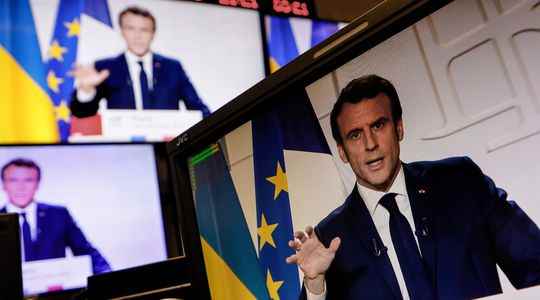Confined to France for several weeks, Emmanuel Macron has ants in his legs. While he was campaigning, between visits to villages and debates on the decline in purchasing power, the French president saw the parade of European leaders in kyiv, in a Ukraine at war: the Spaniard Pedro Sanchez, the Dane Mette Frederiksen , the Briton Boris Johnson… Even the leaders of the European institutions, Ursula von der Leyen and Charles Michel, came to personally greet the hero of the Ukrainian resistance, Volodymyr Zelensky.
The latter personally invited Emmanuel Macron to come to Ukraine, in order to see “the genocide perpetrated by the Russians”. Re-elected, nothing now prevents the French head of state from making the trip. “The president has already been to kyiv before the war, and he is ready to return there, blows one of his diplomatic advisers. He wants this visit to be useful to the Ukrainian cause, to bring him security guarantees and support. operational.”
Accelerating Europe’s transformation
Beyond Ukraine, the French president would think about a tour of European capitals, a way to launch a major reflection on the new security situation in Europe and to maintain unity against Moscow. A way, too, to show that it will be necessary to count on France and its will to reform in the five years to come.
“Europe will continue to be a pillar of the Macron presidency, he will put a lot of pressure on his partners to transform it and implement his 2017 Sorbonne speech, explains Georgina Wright, director of the Europe program. Montaigne Institute. In particular, he wants to modernize the Schengen area of free movement, which he has not yet succeeded in doing, and weigh in on the debate on the reform of budgetary rules. He will want to go further and faster. ”
The French president wants to take advantage of the momentum offered by his re-election to advance his dream of “powerful Europe”, which he reiterated during the presidential election. With Olaf Scholz at the head of Germany and Mario Draghi in Italy, the French president has two strong allies to move Europe. He will need it, as the battle promises to be tough in Brussels in the coming weeks.
In Brussels, the increasingly delicate unity against Russia
The unity of the Twenty-Seven is cracking up against Moscow, after the re-election of Viktor Orban in Hungary and as economic sanctions drive up prices in Europe. “The discussion on sanctions will become more difficult, underlines Georgina Wright. France will continue to be at the center of conversations on these European sanctions, as it has been since the start of the war: even if they are coordinated by the European Commission, Paris plays an essential role behind the scenes.” French diplomacy is now pushing for the establishment of an embargo on Russian oil “as of the next few weeks”, and is receiving positive signals from Berlin on this subject.
At the same time, Emmanuel Macron does not rule out resuming discussions with Vladimir Putin, whom he has not had on the phone since March 29. “We do not dialogue with Putin just for the pleasure of dialogue, poses an adviser to the president. We do it to obtain a ceasefire as quickly as possible and create the conditions for a valid negotiation. In the current situation, that seems difficult, but he will do so in full agreement with President Zelensky and at his request, when it is again appropriate.” The diplomatic recovery will not be easy.
